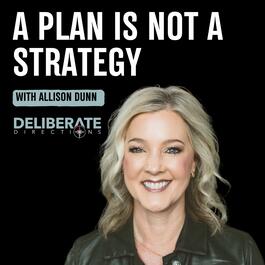
This episode of the Deliberate Leaders Podcast focuses on the critical distinction between planning and strategy, highlighting how confusing the two can negatively impact business outcomes. The host, Allison Dunn, positions that many businesses mistakenly focus on planning, which involves internal operations and resource management, rather than on developing a strategy that creates meaningful differentiation in the market. Key topics and examples discussed in the episode: Defining Strategy: A strategy is defined as an integrative set of choices that position a company to win in its market by outperforming competitors and delivering unique value to customers. Planning vs. Strategy: The host emphasizes that planning is simply a set of activities that, while controllable, do not guarantee competitive success. In contrast, strategy focuses on achieving a competitive outcome where customers choose your product or service over others. Southwest Airlines Example: Southwest Airlines is presented as a prime example of a company with a clear strategy. Instead of just planning routes and buying planes like major carriers, Southwest focused on becoming a reasonable-priced alternative to Greyhound. They achieved this by implementing point-to-point flights, using only 737s, eliminating in-flight meals, and promoting online booking. Starbucks Example: Starbucks is highlighted as a company that created a 'third place' between home and work with consistent quality and experience, showcasing a clear strategy for standing out in the market. Self-Assessment: The host provides a self-assessment for listeners to determine whether their business decisions are focused on internal operations (planning) or creating market differentiation (strategy). Actionable Takeaways: The episode includes several actionable steps to help listeners shift from planning to strategy: • Embrace uncertainty and accept that success cannot be guaranteed in advance. • Clearly articulate the logic behind your strategy by identifying what must be true about your company, industry, competition, and customers for the strategy to succeed. • Keep the strategy simple and concise, ideally fitting on a single page. • Be wary of strategies that feel too comfortable, as real strategy involves trade-offs. • Ensure the strategy is not easily copied by competitors. • Continuously monitor and adjust the strategy as the market evolves. The Comfort Trap: Planning is described as a 'comfort trap' because it focuses on controllable activities but may not lead to competitive advantages. Customer Value: The episode concludes by emphasizing that customers prioritize unique value over plans, making strategy essential for delivering what customers truly want. Additional Resources: • A free, one-page strategy template is available on the Deliberate Directions website. About the Host: Allison Dunn • Host of the Deliberate Leaders Podcast • Business Coach • Founder of Deliberate Directions Connect: • Website: Deliberate Directions • Podcast: Deliberate Leaders Podcast Reminder: Subscribe and leave a review to support the podcast!
From "Deliberate Leaders Podcast with Allison Dunn"


Comments
Add comment Feedback